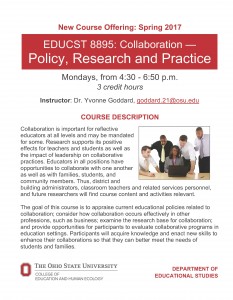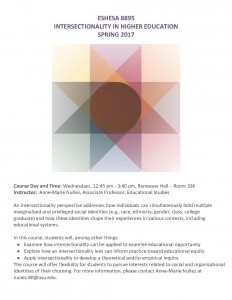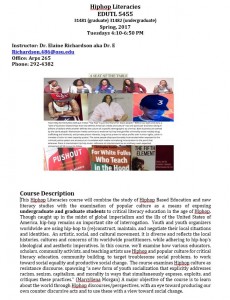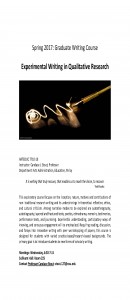8400-sp-2017-flier
Geography 8400: Critical Issues in Human Geography
Spring 2017 – ‘THE SOCIAL POWER OF ALGORITHMS’
Tuesdays, 2:15-5:00, Derby 1116
Nancy Ettlinger, 1144 Derby, ettlinger.1@osu.edu; 292-2573
This graduate seminar takes its specific name from an apt title of a recently published article ‘The Social Power of Algorithms.’ Broadly, the point of the article and the course overall is that in the new millennium algorithms infuse social, work, political, and personal lives through firms, government, as well as the often unconscious participation of ordinary people engaged in daily practices of work, consumption, and digital sociality. Unconscious participation in the digital regime of governance reflects a particular feature of algorithmic life: the invisibility of power relations that underscore it, a post-panoptic reality. The course focuses on the socio-economic, political, and subjective dimensions of algorithmic life and engages topics ranging from how algorithms govern and shape our lives as consumers, citizens, and workers, to issues of subjectivity in relation to digital technologies and possible avenues of contestation and algorithmic resistance. The course approaches algorithms and big data more generally from a critical, not a technical vantage point, consistent with the burgeoning, interdisciplinary field of critical data studies.
Specific topics will include: (reading is tentative — there is probably too much here; I will have to cut)
– how algorithms infuse everyday life & the consequences
tentative reading: “The social power of algorithms” (Beer, Information, Communication & Society, 2017); “Engineering the Public: Big Data, Surveillance, and Computational Politics” (Tufekci, 2014); “Crowdsourced Surveillance and Networked Data” (Lally, Security Dialogue, 2016); Algorithmic Life: Calculative Devices in the Age of Big Data (Amoore & Piotukh, eds., 2016); The Black Box Society: The Secret Algorithms that Control Money and Information (Pasquale, 2015); Weapons of Math Destruction: How Big Data Increases Inequality and Threatens Democracy (O’Neil, 2016)
– the materiality of the cloud: how the cloud touches down in specific places & consequences
tentative reading: The Prehistory of the Cloud (Hu, 2015); “The Global Assemblage of Digital Flow’: Critical Data Studies and the Infrastructures of Computing” (Pickren, Progress in Human Geography, 2016); Cyber-Proletariat: Global Labour in the Digital Vortex (Dyer-Witheford, 2015).
– work and prosumer capitalism in the digital economy
tentative reading: “The Governance of Crowdsourcing: Rationalities of the New Exploitation” (Ettlinger, Environment & Planning A, 2016); Digital Labor: The Internet as Playground and Factory (Scholz, ed., 2013); Digital Labour and Prosumer Capitalism: The US Matrix (Frayssé & O’Neil, eds., 2015); “Prosuming (the) Self” (Charitsis, Ephemera, 2016); “A New Algorithmic Identity: Soft Biopolitics and the Modulation of Control” (Chenney-Lippold, 2011)
– algorithms & discrimination: new mechanisms of segregation
tentative reading: “Racial Formation, Inequality and the Political Economy of the Web” (Mcllwain, Information, Communication & Society, 2016); “’Health and Ancestry Starts Here’: Race and Prosumption in Direct-To-Consumer Genetic Testing Services” (Merz, Ephemera, 2016); How Social Media Undermines Transitions to Democracy (Lynch, Freelon, Aday, 2016).
– algorithims and affect
tentative reading: “Social Media, Financial Algorithms and the Hack Crash” (Karppi & Crawford, Theory, Culture & Society, 2015); “The Conservatism of Emoji: Work, Affect, and Communication” (Stark & Crawford, Social Media and Society, 2015).
– strategies of digital resistance
tentative reading: Coding Freedom: The Ethics and Aesthetics of Hacking (E.G. Coleman, 2013); a number of articles in Big Data & Society; “Intifada 3.0? Cyber-Colonialism and Palestinian Resistance;” (Tawil-Souri & Aouragh, Arab Studies Journal, 2014); “This One Does not go up to 11: The Quantified Self Movement as an Alternative Big Data Practice;” “From Social Movements to Cloud Protesting: The Evolution of Collective Identity” (Milan, Information, Communication & Society, 2015).
– reflections
tentative reading: Exposed: Desire and Disobedience in the Digital Age (Harcourt, 2015); Critical Theory and the Digital (Berry, 2014); “Postscript on the Societies of Control” (Deleuze, October, 1992); “The Neoliberalisation of the Self: ‘Human Computers’ in 21st Century Capitalism” (Ettlinger, Workshop on Technology of the Self – University of Chicago, December 2016)
Students will be evaluated on the basis of discussion facilitation and a paper that connects issues engaged in the course with their research.






